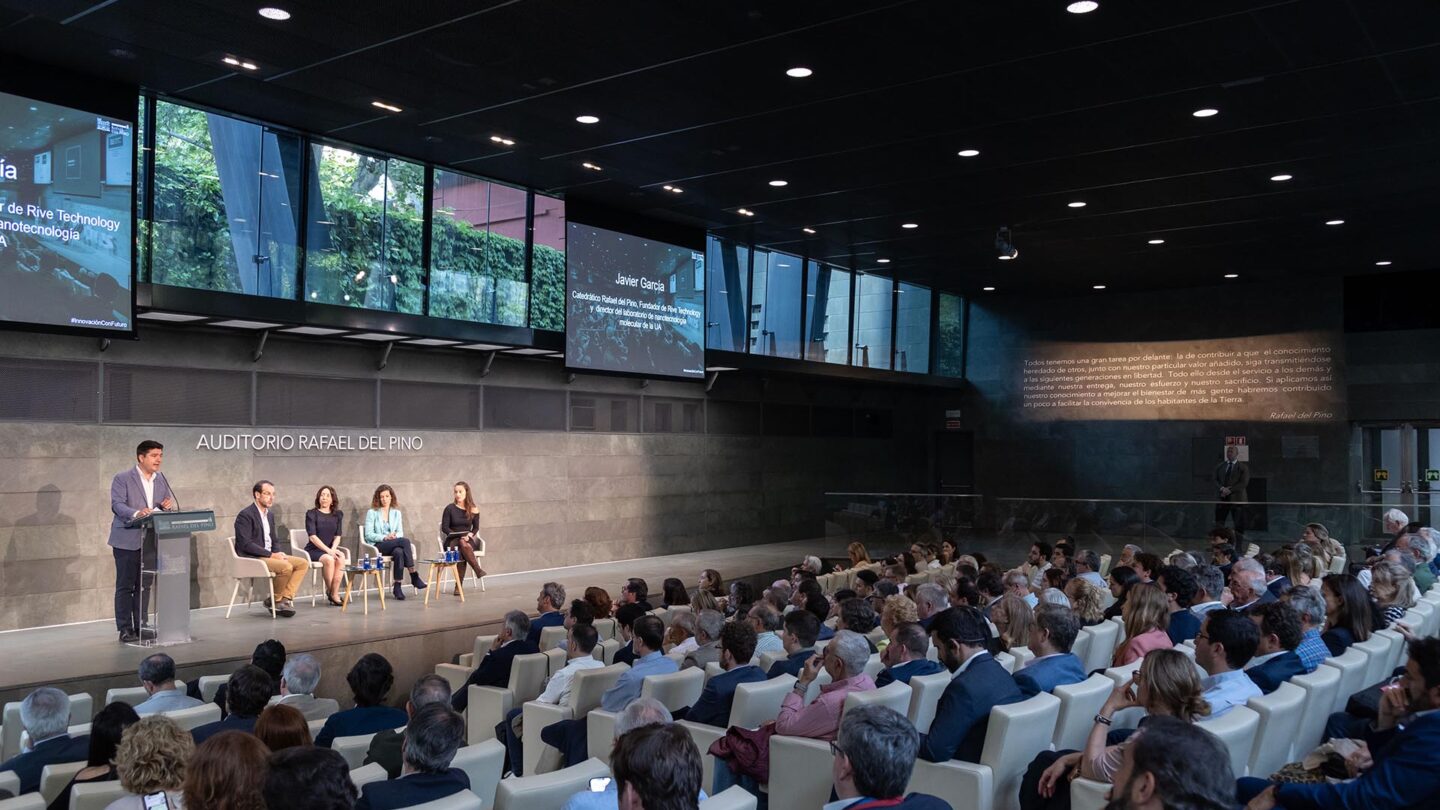
"This is a time for high beams. Lights with which to illuminate a complex, dark and confusing time that does not allow us to see clearly", began the director of the Rafael del Pino Foundation Chair in Science and Society, Javier García MartínezIn his speech at the presentation of the book Innovation with a future at the event held in a packed Rafael del Pino Auditorium, mostly representatives of the scientific and business world, including experts from the Chair and the president of the CSIC, Eloísa del Pino.
García Martínez was preceded by the president of the Rafael del Pino Foundation and author of the prologue to the book published by Grupo Planeta's Gestión 2000. Maria del Pino recalled that "my father created the foundation that bears his name out of a noble desire to contribute to the training of the leaders of the Spain of the present and the future", and in fulfilment of this mission, "the foundation offers scholarships of excellence and training programmes, organises conferences and meetings, and supports research and the dissemination of knowledge by various means, including the Rafael del Pino Chairs".
This was followed by the President of the CEOE, Antonio GaramendiHe stressed that "to invest in innovation, companies have to make money" and highlighted several challenges of the current moment: the ethical dimension of artificial intelligence, "machines cannot be above human capabilities"; the shortage of talent; and the fight for equality and the incorporation of women into STEM careers. Garamendi called for "preparing society for profound change" and argued that "the only way to win the future is to build a modern industrial country".
Javier García Martínez stated at the beginning of the presentation of the work Innovation with a Future that the current uncertainty is compounded by the factor of speed of changeWe have to decide without being sure of our decisions". In this sense, the work that he has directed in the Chair in Science and Society, with the collaboration of the analysts Fernando Gomollón y Eugenio Mallol and with the impetus of the Foundation's Director General, Vicente MontesThe project, to whom he dedicated a special word of thanks together with the rest of his team, is intended to be "a roadmap for moving in a complex and fascinating time", because "in the race to transfer knowledge to the market, those who dare to do so are the winners".
"It is the time of the brave", emphasised the professor and entrepreneur, and he encouraged people to bet on "those technologies halfway between the laboratory and the market" because "if we are quick, they can help us to transform traditional sectors or create new industries". One of the characteristics of our times, he added, is that "many of the companies that are redefining the rules of the game are based on science". He cited OpenAI, Nvidia and Moderna as examples. "Scientists are in the engine room and also on their boards.
This shows, according to García Martínez, that "science gives us solutions that are also business opportunities".The scientists who dare to bring their discoveries to the market will be the key players of the 21st century". Taking advantage of the new circumstances therefore requires "a change of mentality", the future cannot be built "on the basis of a mere accumulation of technologies".
Round Table
The book launch event Future Innovation reserved for the final stretch a conversation at a moderate altitude by Oihana BasilioMIT Fellow in Deep Tech Entrepreneurship. Almudena Trigo, president and founding partner of Beable Capital, said that in the field of investment, "the deep science is going to make a difference" as science "is the biggest producer of technology". He cited, in this regard, that 90% of the sustainability patents in Europe are from deep scienceThe EU is committed to promoting initiatives to promote the development of new technology patents, as well as two thirds of the technology patents that Brussels considers to be more strategic. The EU is therefore committed to promoting initiatives for science equity on the market.
For his part, the president of PLD Space, Ezequiel SanchezHe called for "avoiding over-regulation in a sector that is just starting out" and highlighted the fact that his company, the first European start-up capable of launching a rocket into space, has managed to raise 85 million euros in private investment "despite the fact that there is no investment capital in Spain for pre-revenue companies like ours". This, he said, "has more merit if possible than having managed to get the rocket to fly". His proposal is also that "talent should rotate" around PLD Space, "with spin-offs that generate interesting opportunities and feed back into the sector".
Finally, Elena González-BlancoMicrosoft's head of artificial intelligence for digital natives EMEA, said that AI is halfway "between deep tech and deep science", adding that "we cannot conceive of advancing science without the involvement of business". On that path, in his opinion, "we are lagging behind", in what constitutes "a cultural challenge within companies". We must prevent the excess of "requirements" from becoming "a brake on innovation", González-Blanco pointed out, "the fear of innovation is very much alive in this industry".
You can relive the event on video here: Meeting; "Innovation with a future in Spain" (youtube.com)


